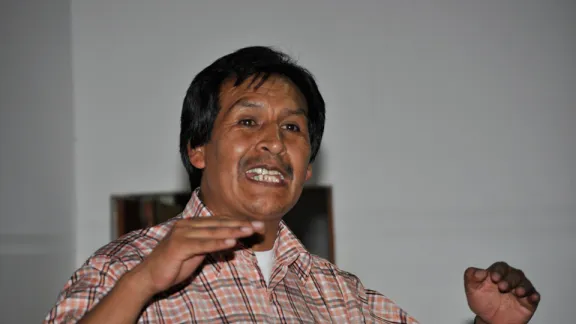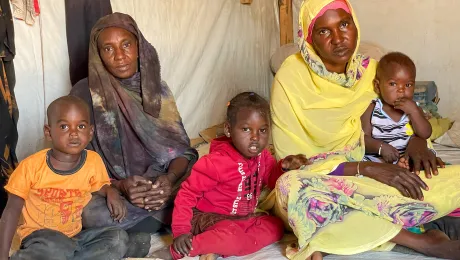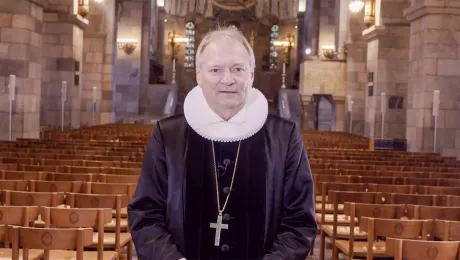
Rev. Emilio Aslla, president of the Bolivian Evangelical Lutheran Church, speaks at the LAC regional gathering on sustainability © LWF/Edwin Mendivelso
Sharing of Gifts and Resources Explored in Latin American and Caribbean Context
A regional meeting of The Lutheran World Federation (LWF) in Bolivia’s eastern city of Santa Cruz is assessing how churches emerging from contexts of strong social, economic and political crises can be a prophetic voice of hope amidst massive impoverishment, violence and inequality.
“That is why today we have hope, that is why today we struggle with stubbornness,” states the theme of the 18-22 September gathering of representatives from the 16 LWF member churches in the Latin American and Caribbean (LAC) region, and partner organizations.
Hosted by the Bolivian Evangelical Lutheran Church (IELB), the 54 participants comprise church leaders, members of networks of women and youth, persons living with disabilities, theological educators and diaconal (social service) workers. They will discuss lessons learned, review challenges and offer recommendations from a five-year program (2007-2011) aimed at developing local capacity and empowering leadership to strengthen churches’ institutional and human resources for witness in their contexts.
The major objective of the meeting organized by the LWF Department for Mission and Development (DMD) through the LAC and Human Resources Development (HRD) desks is “to concretely define how best churches in the region can develop human and institutional capacities that support their contribution to God’s mission, and in the process build the Lutheran communion,” said LWF area secretary for LAC, Rev. Dr Patricia Cuyatti.
She noted that throughout the five-year program, churches affirmed various local initiatives and explored the kind of church they want to be in their respective contexts, and how they could best express and witness their faith. Empowering the leadership was an integral component as well as the mutual sharing of gifts and resources between the different churches.
“The IELB is very pleased for the opportunity to welcome the regional meeting and offer its perspectives as a church mainly of indigenous people in this country,” said Rev. Emilio Aslla, president of the IELB.
“Our church can share the talents of teaching, preaching, agronomy, psychology and medicine. And also gifts of music and playing soccer. In the local church, 40 percent are youth and they are coming to the church through the music and soccer games,” he explained.
Aslla said participatory and inclusive processes were crucial in addressing the sustainability of churches in minority contexts in particular. “We need perspectives on the different methodologies that can consolidate and strengthen our commitment and solidarity with the people we serve, and strengthen us as a communion of churches.”
He underlined the need for the region’s churches to work together in affirming their “social commitment to serve our people and improve their living conditions.”
The 22,000-member IELB is organized in 105 congregations served by 26 ordained pastors. It supports community members including women’s groups through projects dealing with education, water supply and food security.
The churches in the LWF LAC region bring together more than 846,000 members. (497 words)
(Bogota [Colombia]-based journalist Edwin Mendivelso contributed to this story.)


